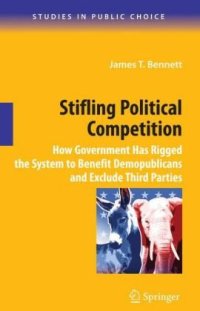
Ebook: Stifling Political Competition: How Government Has Rigged the System to Benefit Demopublicans and Exclude Third Parties
Author: James T. Bennett (auth.)
- Genre: Education
- Tags: Political Science, History
- Series: Studies in Public Choice 12
- Year: 2009
- Publisher: Springer-Verlag New York
- Edition: 1
- Language: English
- pdf
Stifling Political Competition synthesizes political science, economics, and history to demonstrate how the two-party system is the artificial creation of a network of laws, restrictions, and subsidies that favor the Democrats and Republicans and cripple potential challengers, depriving voters of truly vigorous political debate. Daring in its criticism of the current state of affairs and provocative in its calls for radical reform, Stifling Political Competition is a timely and important contribution to any discussion of the impact of party politics and the prospects for achieving effective representation.
Stifling Political Competition is a carefully researched and highly readable book that shows how federal, state, and local governments have enacted laws, regulations, and subsidies that discriminate in favor of the Democratic and Republican parties and virtually prohibit challenges by independent parties and candidates. The unfortunate result is limited choice in the political arena. This book is essential reading for anyone interested in political competition and public policy.
Walter E. Williams, John M. Olin Distinguished Professor of Economics, George Mason University
Finally, a book that exposes the reality that U.S. elections are substantially less free and less meaningful than elections in most other developed nations. Professor Bennett, an economist, has given us a book that should have emerged long ago from the ranks of political scientists. Stifling Political Competition is an interesting and very well-written study full of insights into the election process.
Richard Winger, Editor, Ballot Access News
In Stifling Political Competition, James Bennett combines a detailed historical analysis of the rise of the two party system with the insights of the public choice school of economics to explain how the American people are ill-served by laws that limit their choices at the ballot box. Every American looking for ways to increase voter participation and open up the political process to all points of view should read this important book."
Norman Kirk Singleton, Legislative Director, Congressman Ron Paul
James T. Bennett is Eminent Scholar and William P. Snavely Professor of Political Economy and Public Policy at George Mason University and Director of The John M. Olin Institute for Employment Practice and Policy. He is the author of numerous scholarly articles and over a dozen books, including From Pathology to Politics, Unhealthy Charities, and The Politics of American Feminism.
Stifling Political Competition examines the history and array of laws, regulations, subsidies and programs that benefit the two major parties and discourage even the possibility of a serious challenge to the Democrat-Republican duopoly. The analysis synthesizes political science, economics and American history to demonstrate how the two-party system is the artificial creation of a network of laws, restrictions and subsidies that favor the Democrats and Republicans and cripple potential challenges. The American Founders, as it has been generally forgotten, distrusted political parties. Nowhere in the U.S. Constitution are parties mentioned, much less given legal protection or privilege. This provocative book traces how by the end of the Civil War the Republicans and Democrats had guaranteed their dominance and subsequently influenced a range of policies developed to protect the duopoly. For example, Bennett examines how the Federal Election Campaign Act of 1971 (as amended in 1974 and 1976), which was sold to the public as a nonpartisan act of good government reformism actually reinforced the dominance of the two parties. While focused primarily on the American experience, the book does consider the prevalence of two-party systems around the world (especially in emerging democracies) and the widespread contempt with which they are often viewed. The concluding chapter considers the potential of truly radical reform toward opening the field to vigorous, lively, contentious third-party candidacies that might finally offer alienated voters a choice, not an echo.